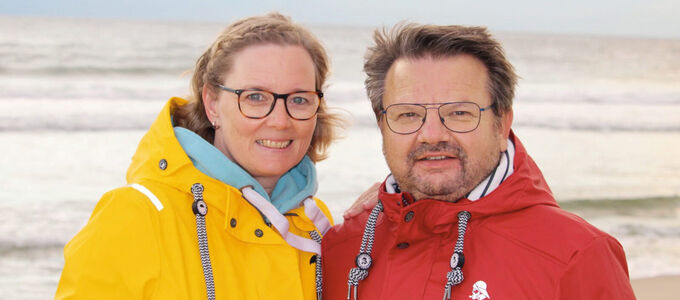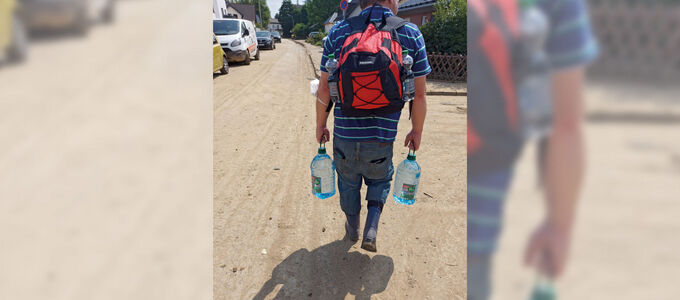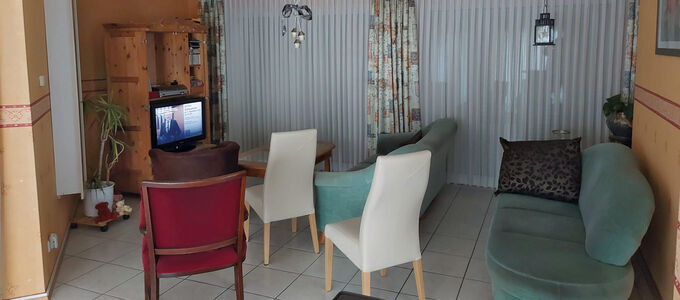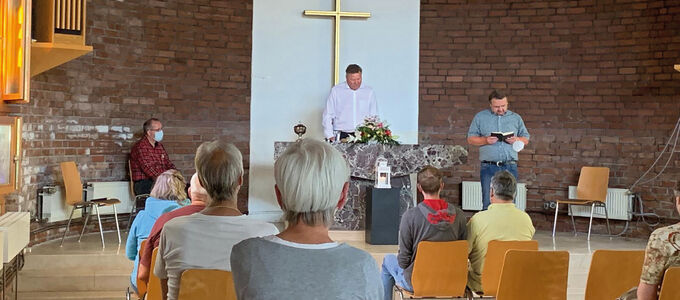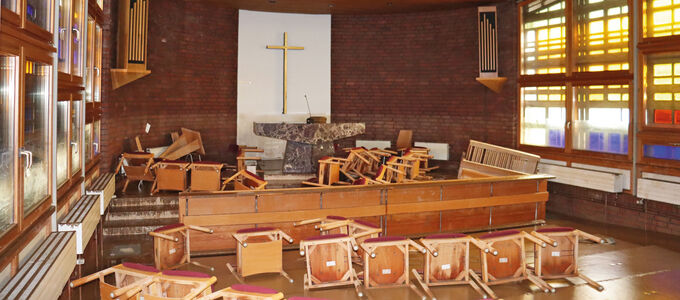
Some 17,000 people are still grappling with the aftermath. The deadly flood in the Ahr Valley in Germany last year killed 133 people and destroyed or damaged thousands of homes. Ulrich Thurau, who has been rector of the congregation of Sinzig since 1998, reports the following.
“I woke up in the middle of the night because the smell of oil, gas, and diesel. And I heard dull, banging noises that I could not place,” Ulrich Thurau says about the night of 14 to 15 July in which a flashflood destroyed ancient towns and villages in Germany. “In front of our house there is a street lamp and I was wondering why it was so dark outside. Then we discovered that we had no electricity. At around three o’clock in the morning, a fire engine drove through the village and all I heard was the word: state of emergency.”
The strange sounds came from the Ahr River. “What is normally an eight to ten-metre-wide and gentle river turned into an 800-metre-wide raging torrent that tore through our village. The Ahr had developed a strong undertow that carried away objects that crashed into each other and were hurled against walls as the raging river ripped through the villages. Oil tanks and gas tanks had been washed up from cellars, and bridges collapsed into the raging flood waters.”
Worried about the members of the congregation
Shepherd Thurau’s house was spared because it is farther away from the river’s banks. “The houses that were directly on the bank of the river were practically submerged. Helicopters circled all day. Emergency services rescued people who were waiting on their roofs for help. All day long we heard sirens.”
The couple’s biggest concern was for the members of the congregation. Because of the destroyed infrastructure, it was not possible to contact anyone. They could neither reach the members by phone nor by car. “When the floodwaters receded, the aftermath became visible: the flood had sept away roads, everything was full of sludge, there was debris everywhere, and cars had been piled on top of each other. Entire bridges had been swept away.” The rector and his wife made their way on foot to see how the members of their congregation were doing.
„“What we saw and heard was unbelievable. Some of our brothers and sisters had been trapped in their homes and had to be evacuated by boat.” The rector and his wife were overjoyed when they reached a family or a member. Four families from the congregation lost everything they owned. Fortunately, all survived, which was anything but matter of course that night. 133 people died in the district of Ahrweiler that night.
Our church building in Sinzig had also been submerged. “The evening before, we still had a service. At the time, we had no idea that houses had already been swept away on the upper reaches of the river. A few hours later we would not have been able to leave the church, as it was completely surrounded by flood waters,” the rector says.
Many wanted to help
“The great solidarity in this exceptional situation was overwhelming.” He reports in particular on the solidarity of the Church members. “Members from across Germany contacted me and offered to help affected families. We received a huge amount of donations in kind. It was much more than was needed so that we distributed it in the area. There was everything from cosmetics to blankets, clothing, and furniture,” Shepherd Thurau remembers.
Shepherd Thurau illustrates this solidarity using the example of a family from the south of Germany who wanted to help and tried to contact a family affected by the disaster. The family offering their help had the same surname as an affected family in his congregation. Without really knowing anything more about the family offering help, he decided to put them in touch with the family in his congregation who happened to have the same surname. Before doing anything, he obtained the consent of the affected family and asked what they needed most. The brother told him that he urgently needed an electrician. What joy and gratitude when, a few days later, it turned out that the father of the family who had offered their help worked in this very field.
“It was such experiences that ultimately gave me strength. I don’t know what I would have done if I had been directly affected myself. It was always the good Lord who did the extraordinary things. And to experience this regularly was impressive,” Shepherd Ulrich Thurau relates.
One year on
What is the situation today, a year after the flood? “It depends where you are,” Ulrich Thurau says. “I was in the centre of Bad Neuenahr the other day and was really shocked. You get the impression that only the bare minimum has been done: cars and debris have been cleared from the street, but shop windows are still boarded up and there is a dank smell in the air.” And behind every window there is a family or a person with a particular fate. “For some the rebuilding is going well. For others things are not progressing well, perhaps because there are no relatives in the area who can take care of things.” In the end, it seems to depend on how socially integrated one is. “I was impressed and touched by how many brothers and sisters from all over expressed their empathy for the suffering of the brothers and sisters and the people in the Ahr Valley. Experiencing this has given me a lot of strength, courage, and confidence.”
A detailed version of this report was published in the German magazine “Unsere Familie”, issue 06/2022.






